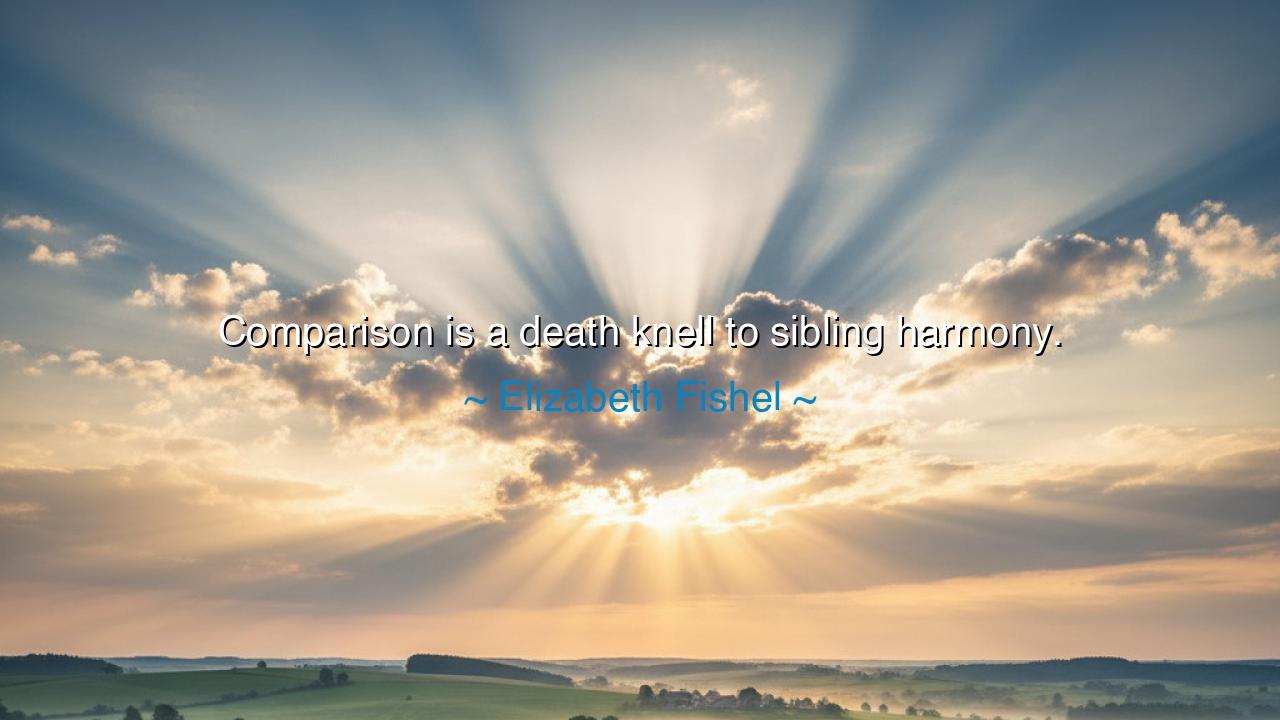
Comparison is a death knell to sibling harmony.






In the wise and piercing words of Elizabeth Fishel, “Comparison is a death knell to sibling harmony,” we hear a truth that stretches back to the dawn of human families. It is a simple statement, yet it carries the weight of centuries of love and rivalry, of kinship tested by envy and wounded pride. The death knell she speaks of is not the toll of a bell upon a battlefield, but the quieter, more tragic sound that echoes within homes—the slow fading of affection between those who should have been each other’s refuge. Fishel’s words remind us that where comparison reigns, unity withers, and the sacred bond of brotherhood or sisterhood is undone by the poison of measuring one soul against another.
The meaning of her quote lies in the destructive nature of comparison, that ancient impulse of the human heart to weigh one’s worth against another’s. Within families, it is a venom that seeps silently. When one child is praised as brighter, stronger, or more successful, the other does not merely feel overlooked—they begin to believe themselves less. What begins as a subtle imbalance in attention or affection can grow into a lifelong estrangement. Fishel understood that love cannot flourish where judgment dwells; that affection, to endure, must see each person as unique and incomparable. The harmony of siblings, like music, depends on difference working in accord—not on one note striving to outshine another.
This truth is as old as the first stories ever told. The tale of Cain and Abel, sons of Adam and Eve, stands as the earliest warning. Two brothers, bound by blood, were torn apart by divine favor and comparison. Abel’s offering pleased God; Cain’s did not. And in that moment, when comparison entered the sacred circle of family, love gave way to envy, and envy to violence. The first death among humankind was not of a stranger, but of a brother. The story endures not as a tale of wrath alone, but as a symbol of the fragility of harmony when love is measured instead of given freely. From that time onward, the wise have known that comparison kills what it touches—it turns kin into competitors and affection into bitterness.
History, too, bears witness to this truth. Consider the rivalry of Cleopatra and her brother Ptolemy XIII, rulers of Egypt. Their shared throne became a battlefield because each measured power against the other, each refused to share the light. The result was not glory, but ruin—a kingdom plunged into civil war, and a family forever broken. Their story, like so many, teaches us that those who let comparison rule their hearts destroy the very bonds that could have made them strong. For comparison blinds us to our own gifts; it makes us see in another’s light the shadow of our own supposed failure.
Yet, Fishel’s words are not merely a lament—they are a call to awareness and love. She reminds us that harmony, whether between siblings, friends, or colleagues, is a living thing that must be guarded from the winds of envy. True harmony does not demand equality in ability or achievement, but equality in respect and affection. To honor another’s strengths without feeling diminished is the mark of wisdom; to celebrate another’s joy as one’s own is the sign of true kinship. The family that learns this lives in peace; the one that forgets it, lives in quiet sorrow.
In her insight lies also a lesson for all human relationships. For though we speak of siblings, comparison is the adversary of harmony in every realm—between nations, between lovers, between generations. When we measure ourselves against others, we lose sight of our path. The ancient sages taught that the oak does not envy the rose, nor the river the mountain; each fulfills its purpose in the grand design of life. So too must we remember that no two souls are alike, and that love thrives only where there is room for difference.
And so, dear listener, let this be the lesson: banish comparison from the heart if you would preserve love. Speak words that uplift rather than measure. When you praise, do so without belittling; when you admire, do so without envy. If you are a parent, praise each child for their own gifts. If you are a sibling, learn to rejoice in your brother’s strength and your sister’s triumph. For in this way, you will silence the death knell and restore the harmony that Elizabeth Fishel so wisely cherished.
Remember, then, that every family, like a symphony, depends on difference to create beauty. When one voice grows jealous of another, the song falters; but when each voice plays its part with love and humility, the melody becomes eternal. Comparison is a death knell to sibling harmony, but gratitude and acceptance are the chords that keep it alive. Let those be the music you carry within your home, and it will never fall silent.






AAdministratorAdministrator
Welcome, honored guests. Please leave a comment, we will respond soon